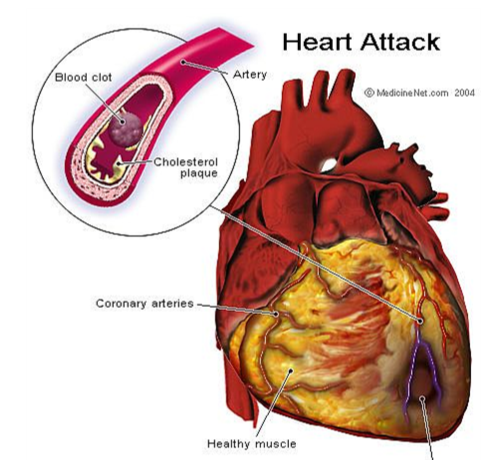Close your eyes for a moment and picture two plates with nothing but broccoli on them. Now imagine pouring butter all over the broccoli on one of those plates. Now pick. Which would you choose: the just-broccoli plate or the butter-and-broccoli plate?
Most people will chose the broccoli with butter, but as soon as they make that choice strange thoughts jump into their heads. Even though a buttery meal would taste great, they think that that it is a heart attack waiting to happen.
Stop for a moment and think about this: how did that thought jump into your head? If you think that a heart attack and eating butter are related then that thought must have come from somewhere, right? It had to come from somewhere because if you were to eat a stick of butter, you wouldn’t immediately fall down dead. This means that someone told you that butter and heart attacks are related and they told you often enough that you believe it to be true.
The question you have to ask yourself is this: is that thought correct? Is there a relationship between butter and heart attacks?
When I think about the way that we think about food, it feels like I am watching an old fashioned melodrama where the villain with a black hat and cape has changed his clothing, bleached his hair, and is now wearing all white clothes. The funny thing is that everyone loves the villain and thinks he is the good guy, while the true hero of the story is hated.
The villain in our food story are the foods that act like sugar in our bodies (grains and sugars) and this villain has been getting away with destroying our health for years and, yet, we still see him as the hero in our food story. After all, when you look at a food pyramid grains the bottom of the pyramid (the foods we should eat most). This villain continues to parade around as a good guy, while slowly killing us.
The Good Guy
Okay; if foods that act like sugar are the villain, who is our hero? The answer is: fat. Yes, you read that right: fat. You have been taught all your life to hate fat because that is what your government, your doctor, your nutritionist and even your mother has taught you. This hatred of fat comes from an oversimplification and nutritional nonsense.
Our food melodrama started when medical professionals started cutting open people who had suffered a heart attack and discovered that the hearts of these people were clogged with fat. From there, they made a simple assumption: fat in the heart is caused by fat in the diet. This assumption has gone unchallenged for 50 years- even though there is no research to support this idea. Yes, you also read that right. Fat in our diet does not lead to heart disease (it is the other guy (sugar) that is to blame for heart attacks).
Once people started to believe that eating fat equals heart attack, the ideas that fat equals weight gain wasn’t far behind (even though high fat diets have consistently been shown to reduce weight in scientific studies).
What Puts Fat into Our Blood Stream?
Here is what is strange. If you sample the blood of someone who just ate a pancake breakfast, you will find that their blood is full of fat. But if you take the blood of someone who just ate a steak you would find that there is a lot less fat in the blood. This seems backwards, but science supports this. Why is this? What happens when our bodies are overwhelmed with sugars and foods that act like sugars is that the body is forced to create fat (which is why our pancake-eater has such a high amount of fat in their blood). Our bodies were never meant to deal with a large onrush of sugar, so our body’s only solution is to create fat. We are the ones creating fat in our bodies every time our blood sugar increases.
History
When you look into the history of why we believe what we believe about nutrition, you find that certain charismatic people with the wrong ideas about health were able to convince politicians and medical communities that they were right – despite there being no scientific support for their ideas. The problem has always been that our bodies are more complex than we think. Yes, it makes sense that eating fat will lead to fat in our bodies, but scientific studies find the opposite. What this means is that our bodies are meant eat fat and not meant to eat sugars. When we eat the foods we are meant to eat, our bodies run perfectly. When we eat the wrong foods, our bodies malfunction.
The feelings you and I have for fat are the result of a lifetime of and a concerted effort to make you think that fat is bad for you. But just like the hero in the story above, it is fat that you want to be eating (not sugar and foods that act like sugar). I know that this is hard for you to swallow, but fat is the food source that you want to keep your body running the best it can.
We will be exploring which fats we should be eating in other blogs, for now, though, take a look at your next meal and don’t be afraid to put some butter on your broccoli.
















Good day Dr. Scott.
I have a friend that told me about the health of fatty food and how bad wheat and flour is.
Is it good for a diabetic to eat fatty food?
I’m a type 2 diabetic and do not want to end up on insulin!!! (Hate needles) Thus have I stopped all sugar and cut down on fat.
and is now busy looking for a good diet to follow.
Daniel,
There is no doubt that grains and other foods that act like sugar are bad for diabetics. The fat issue is a bit tricky. While I’m certainly not fat-phobic and think much of the press on fat is plain wrong, it does depend on what type of fat you are eating. Stay away from all vegetable oils (use olive oil or coconut oil) and avoid grain-fed meat as much as possible and you should be okay.
Fat does, by the way, slow the absorption of sugars into your blood stream. This means when include good fats in a meal you are helping to keep your blood sugar lower – so don’t avoid it, just choose healthy ones.
I hope that helps,
Dr. Scott